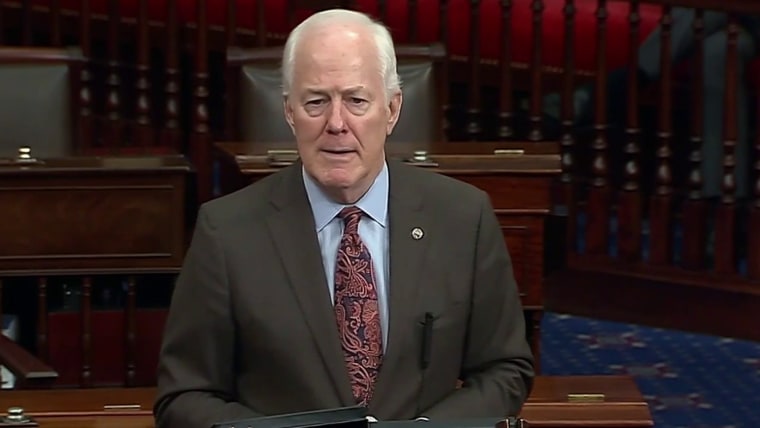Senators hope to reach gun deal in ‘next few days’ after leaving for the weekend
WASHINGTON — The Senate left town for the weekend without agreeing on gun legislation, but the negotiators planned to meet virtually Friday to hash out the lingering issues as they continue to project optimism.
“We’re not there yet,” Sen. John Cornyn of Texas, the chief Republican negotiator, said after an in-person meeting Thursday. “I hope to resolve the remaining differences.”
Some provisions, like mental health funding and school safety, are relatively settled. Others, like “red flag” provisions and background check enhancements, are still being crafted.
The Senate is considering incentives for states to adopt red flag laws that allow people like police officers or family members to petition courts to issue orders to keep firearms away from people who are deemed dangerous. The goal is to get more states to enact such laws, implement them effectively and extend knowledge of how to use them.
“It’s more carrots than sticks,” said a Senate aide familiar with the negotiations, describing it as a state-based approach, in contrast to the House bill passed Thursday, which would create a federal red flag law that would send people to federal courts to issue such orders.
Sen. Lindsey Graham, R-S.C., who’s working with Sen. Richard Blumenthal, D-Conn., on red flag language, said, “You have to write it out, going to let a bunch of people read it, then they’ll make changes. And it’s just a fairly laborious process.”
“This is important enough, in my view, that we need new money. I don’t want to take away from existing programs,” Graham said. “So we’ve got to go find those offsets, and we’re working on it. There are some things we can do to offset it. You’re not talking about hundreds of billions of dollars — looking at under 1 billion.”
He said the negotiators want a deal “in the next few days.”
Senate Majority Leader Chuck Schumer, D-N.Y., said on the floor Thursday that as soon as there is an agreement, he will “bring a measure to the floor for a vote as quickly as possible.”
Background checks and red flag challenges
The thorniest remaining issue is background checks.
“You can sense we’re not far away,” Sen. Chris Murphy of Connecticut, the top Democratic negotiator, told reporters after Thursday’s meeting. “This is really hard stuff politically and, and policywise. So we’re not far away. But we’re, we’re not there. We’re not there yet.”
Republicans have rejected a near-universal background check rule sought by Democrats.
Instead, the bipartisan group is trying to strengthen existing checks by adding juvenile records into the system, particularly involving Americans ages 18 to 21 who may have exhibited dangerous behavior as minors that would prohibit adults from buying guns.
The killer in Uvalde, Texas, “showed up after his 18th birthday as if he was born yesterday” and bought a weapon, Cornyn said.
“There was insight into his many mental health challenges or terroristic threats of fellow students, potential drug use — other things that if he were an adult, he could not pass a background check,” he said on the Senate floor. “But because of the fact that juvenile records are typically sealed and are not part of the NICS review, the merchant who sold him the firearms he used didn’t know anything about his track record.”
NICS is the FBI’s National Instant Criminal Background Check System.
The senators are also exploring whether to require nontraditional gun sellers to register as Federal Firearms Licensees, which would force them to conduct background checks on prospective buyers before they sell weapons.
When it comes to mental health, the group appears focused on a bill crafted by Sens. Roy Blunt, R-Mo., and Debbie Stabenow, D-Mich., which would extend a pilot program that expands behavioral health services and is being implemented in nine states. The bill would cost around $10 billion, and senators have come up with offsets, sources familiar with the discussions said.
Negotiators are also working on redirecting already allocated funds toward school security.
House Democrats, who passed a package of gun bills Thursday that includes raising the minimum age to buy AR-15-style weapons to 21, are pressuring the Senate to act. One of them, Sean Casten of Illinois, who captured a once-safe Republican seat in 2018, read out the names of children killed by gun violence on the floor.
Republicans say they’re feeling pressure to act.
“I think it was important that we send a signal to our country that the acts of violence that are plaguing our nation right now have to stop,” said Brian Fitzpatrick of Pennsylvania, one of five House Republicans who voted for the Democrats’ gun bills Thursday. “We have to take the same approach to these acts of violence as we did towards 9/11. We have to say: Never again. And do whatever it takes.”
Read More: Senators hope to reach gun deal in ‘next few days’ after leaving for the weekend


